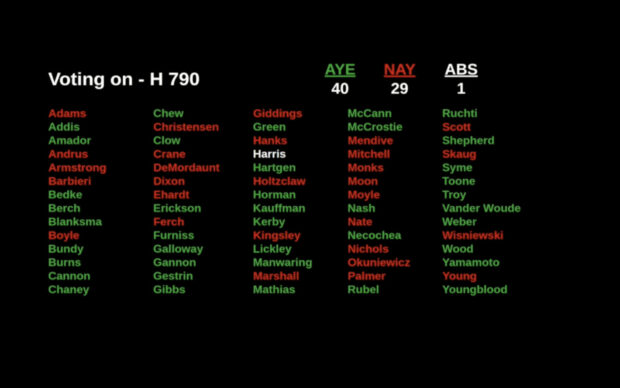A reworked bill to steer $72 million into early literacy programs passed the House Monday — moving the state one step closer to expanded optional full-day kindergarten.
A web of competing proposals, cross-rotunda negotiations and struggles to reach a consensus have followed efforts to funnel part of a record state budget surplus into full-day kindergarten. As the 2022 legislative session could be heading into its final week, Monday’s development marks significant progress toward inking a proposal into law.
The new-look House Bill 790 gives “school districts more flexibility on how they spend their money so they can get the kids to read,” said sponsor Rep. Ryan Kerby, R-New Plymouth.

Lawmakers quickly introduced HB 790 Friday after the original version appeared to be in jeopardy in the House days earlier. Passed Monday, on a 40-29 vote, HB 790 is a mix of two proposals: an earlier Senate bill, changing how K-3 literacy funding is divided between schools; and another bill, requiring school districts to disclose how they plan to spend supplemental property tax levy money.
The resulting legislation has now passed what could be its toughest legislative test in the House, keeping alive Gov. Brad Little’s goal of funneling an additional $46.6 million into early literacy. The Senate Education Committee is scheduled to take up the fast-moving bill Tuesday afternoon.
HB 790 would change state funding to give more literacy money to schools whose students improve on the Idaho Reading Indicator, rather than giving more to schools whose students continually struggle to read at grade level.
“We want results. We’ve changed how we’re asking (schools) to show those results,” said Rep. Julie Yamamoto, R-Caldwell. “I think it’s well worth the money to do that.”
HB 790 still has to clear the Senate, which passed its original version of the bill easily. A separate appropriations bill — which the House skipped while passing all other K-12 budget bills later Monday afternoon — would have to pass both houses to increase early literacy funding and bankroll Little’s proposal.
Budget concerns flavored Monday’s debate on HB 790.
Before voting against the bill. Rep. Greg Ferch, R-Boise, said the proposed $72 million line item is “an awful lot per student.”
Rep. Ron Nate, R-Rexburg, decried IRI test score declines that have occurred during the pandemic, saying increased literacy funding should have produced better results.
“(Declines) cannot be blamed on the pandemic,” he said.
Some lawmakers want school districts to reduce their reliance on local property taxes in exchange for more literacy funding. Proponents of HB 790 hoped disclosures of levy spending would assuage those opponents, by forcing more financial transparency.
It’s unclear whether the rewrite changed any votes. Monday’s 25-minute debate ran shorter than past debates on the topic, and the levy transparency issue was rarely mentioned.
Rep. Gary Marshall, R-Idaho Falls, voted against the bill, saying it “opens the door wide open for full-day kindergarten,” a program he’s unconvinced is net beneficial.
“We have not had that policy discussion and yet the bulldozer is coming down the sidewalk for full-day kindergarten,” Marshall said.
Idaho only pays districts enough to run half-day kindergarten programs, but many districts already use a mix of the existing literacy funding and other funding sources to offer full-day programs.
What the bill does and doesn’t do
HB 790 would award half of early literacy dollars based on schools’ K-3 enrollment, and half based on how many students are reading at grade level or improving year to year on the IRI. It would also weight economically disadvantaged students more heavily in its calculation to give more aid to schools with a higher share of such students.
It would also require school districts to disclose, on the ballot, how they plan to spend supplemental levies. This requirement is nearly identical to a previous standalone bill, which would have allowed districts to change plans for up to 10% of their levy money; HB 790 doesn’t include that flexibility, and requires districts to spend funds the way they said they would, and post spending reports online annually.
The bill wouldn’t give schools new authority to spend early literacy money on full-day kindergarten programs. Many districts already do so.
It also wouldn’t increase funding for full-day kindergarten, or for literacy programs in general. That would have to come in the separate appropriations bill.
